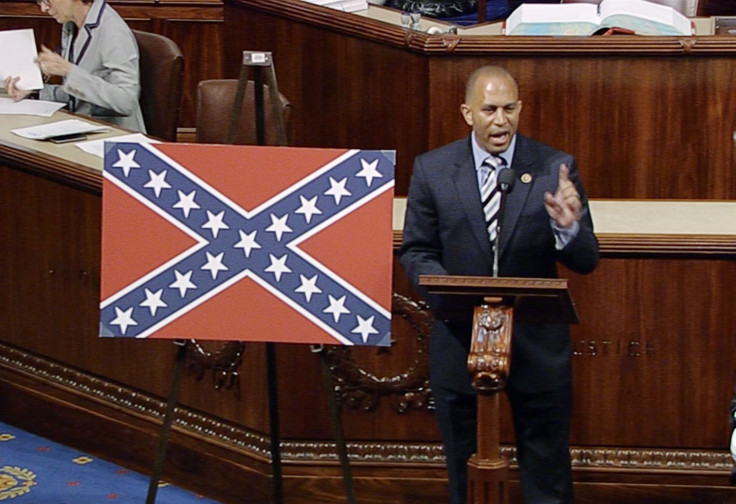'Confederate Swastika' Twitter Hashtag Furthers Debate That Confederate Flag Is Akin To Nazi Symbol

With news that the South Carolina House approved a bill to remove the Confederate flag from the state house grounds on Thursday, and the U.S. House voted to ban the display of Confederate flags at federal cemeteries on Wednesday, op-ed writers have begun to discuss parallels between the Confederate flag and the Nazi swastika. Since the fall of the Third Reich in 1945, Nazi symbols and flags have been banned in Germany.
So confused is the nation's relationship to this symbol of the Civil War and slavery that five states still have laws on the books making it a crime to desecrate or use the Confederate battle flag in any way that doesn't honor it.
But an 800-word op-ed might not be as effective at disseminating this message as a hashtag and a 140-character tweet. Via hashtags like #ConfederateSwastika, many on Twitter are making the connection between the infamous Nazi symbol and the Civil War relic that represents, as Ishaan Tharoor put it in a Washington Post op-ed, "not heritage, nor pride, nor a badge of Southern identity, but a regime of white supremacists who went to war against the Union in order to preserve the inhuman institution of slavery."
What's so wrong with wanting to preserve a little heritage?!!
Dave Granlund cartoon
#uspol #tcot #Charleston pic.twitter.com/R6x7EwgRiu
— Sir StanDeSteam (@StanSteam2) June 23, 2015Saying the confederate flag isn't a symbol of racism is like saying a swastika isn't a symbol of antisemitism
— Pat (@ylleKJkcirtaP) July 8, 2015The swastika. The burning cross. The confederate flag. These are like bat signals to racists. That's why banning their formal use matters.
— Aniyar Uoke (@eclecticbrotha) July 8, 2015@Humoritarian These guys agree. #SouthernPride #ConfederateFlag #ConfederateTakeDown #confederateswastika pic.twitter.com/YrwGri0QfH
— absentspace (@absentspace) July 3, 2015 we NEED "unreasonable" people #BreeNewsome #Bree #FreeBree #ConfederateFlag #ConfederateTakeDown #confederateswastika pic.twitter.com/yQSufWXH1G
— g flores (@abejaclaustro) June 28, 2015Yes, even in #Belgium... #ConfederateTakeDown #confederateswastika #BlackLivesMatter pic.twitter.com/KBsju40w6p
— Jago Kosolosky ✈ (@Jago_Kosolosky) June 27, 2015But not everyone is convinced that critiquing, much less getting rid of, the Confederate flag makes sense.
#ConfederateFlag #ConfederateTakeDown #confederateswastika #tcot #uniteblue #tlot #gop #LiberalLogic #democrats #tgdn pic.twitter.com/A6gHfd3o89
— Chet's Ascertainment (@kttk234567) July 8, 2015In an interview with NBC News’ Ron Allen, Jeff O’Cain, a former commander of the Sons of Confederate Veterans, described what he sees when he looks at the Confederate flag: "I see bravery, I see honor, I see country." When Allen asked O'Cain to respond to people who "see slavery, racism, the Klan" in the flag, he got angry. “They stole it and dishonored the flag. That flag never had anything to do with slavery.”
Racist history buff explains how traitors got their asses kicked. #confederateswastika http://t.co/zymDckatOv
— shouldavoted (@shouldavoted) June 24, 2015© Copyright IBTimes 2025. All rights reserved.






















